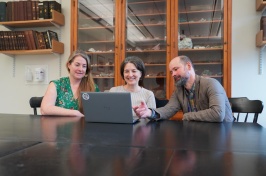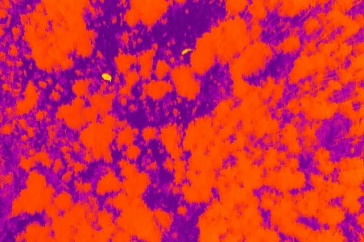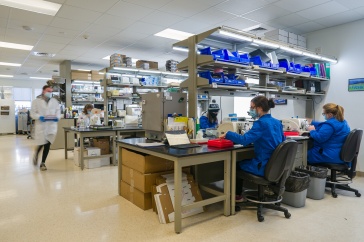
Geospatial analysis is a powerful tool widely used to address a number of issues, including climate change modeling, weather monitoring, human population forecasting, and animal population management. Now a new book by a University of New Hampshire professor demonstrates the power of incorporating remotely sensed imagery in geospatial analysis.
Dr. Russell Congalton, professor of remote sensing and geographic information systems (GIS) at UNH and a researcher with the New Hampshire Agricultural Experiment Station, has written Imagery and GIS: Best Practices for Extracting Information from Imagery (ESRI Press, 2017). The book with co-authors Kass Green and Mark Tukman presents how to turn remotely sensed imagery into geospatial information. The authors have more than 80 years of collective experience using imagery that is represented by hundreds of projects, including many performed by Congalton as part of his NH Agricultural Experiment Station research.
GIS analysts wishing to understand and incorporate more remotely sensed imagery into their geospatial analysis will find this book especially helpful. It provides an overview with sufficient detail for the geospatial analyst to understand and appreciate imagery while also outlining sources of additional information as needed.
“This book brings an appreciation and understanding of the power of imagery to the geospatial community. There are far more GIS/geospatial analysts than there are remote sensing analysts. However, so much of the geospatial information used today is generated from remote sensing. Therefore, it is to the great benefit of everyone that the geospatial analyst become more cognizant of the power of imagery,” Congalton said.
Congalton uses spatial data analysis, remote sensing, and geographic information systems to solve natural resource problems. His research projects have included deer, loon, moose and bear habitat mapping; endangered plant habitat analysis and mapping forest change; fire and fuels management; and eelgrass mapping. Currently, Congalton is incorporating unmanned aerial systems (UAS) imagery into mapping and monitoring forest type and structure. In addition, his research includes mapping and assessing the accuracy of croplands at high spatial resolution all over the world and using remotely sensed data to help evaluate the effectiveness of payment plans in Mexico to improve water quality.
His experiment station work focuses on improving the accuracy of forest and land cover maps developed from remotely sensed information. Congalton and his team will investigate, develop, and evaluate new methods for assessing the accuracy of maps that extend over large geographic areas and/or are derived using a new object-based image analysis method.
“These maps must be of the highest accuracy possible. Techniques for assessing their accuracy are vital to the continued development and effective use of these maps. The successful development of these assessment methods will lead to improved evaluation of these maps that in turn will lead to better management and policy decisions that will benefit everyone,” he said.
Founded in 1887, the NH Agricultural Experiment Station at the UNH College of Life Sciences and Agriculture is UNH’s original research center and an elemental component of New Hampshire's land-grant university heritage and mission. We steward federal and state funding, including support from the USDA National Institute of Food and Agriculture, to provide unbiased and objective research concerning diverse aspects of sustainable agriculture and foods, aquaculture, forest management, and related wildlife, natural resources and rural community topics. We maintain the Woodman and Kingman agronomy and horticultural research farms, the Macfarlane Research Greenhouses, the Fairchild Dairy Teaching and Research Center, and the Organic Dairy Research Farm. Additional properties also provide forage, forests and woodlands in direct support to research, teaching, and outreach.
-
Written By:
Lori Tyler Gula, PhD | NH Agricultural Experiment Station | lori.gula@unh.edu | 603-862-1452





















































